Top Rankings
Mansfield School District ranks among the top 20% of public school district in Connecticut for:
Category
Attribute
Reading/Language Arts Proficiency
Highest reading/language arts proficiency (Top 20%)
Science Proficiency
Highest science proficiency (Top 1%)
Student Attention
Lowest student:teacher ratio (Top 1%)
For the 2025 school year, there are 2 public preschools serving 741 students in Mansfield School District. This district's average pre testing ranking is 9/10, which is in the top 20% of public pre schools in Connecticut.
Public Preschools in Mansfield School District have an average math proficiency score of 64% (versus the Connecticut public pre school average of 35%), and reading proficiency score of 74% (versus the 42% statewide average).
Minority enrollment is 37% of the student body (majority Hispanic), which is less than the Connecticut public preschool average of 59% (majority Hispanic).
Overview
This School District
This State (CT)
# Schools
3 Schools
345 Schools
# Students
1,162 Students
132,954 Students
# Teachers
111 Teachers
10,546 Teachers
Student : Teacher Ratio
10:1
10:1
District Rank
Mansfield School District, which is ranked within the top 30% of all 197 school districts in Connecticut (based off of combined math and reading proficiency testing data) for the 2021-2022 school year.
Overall District Rank
#43 out of 200 school districts
(Top 30%)
(Top 30%)
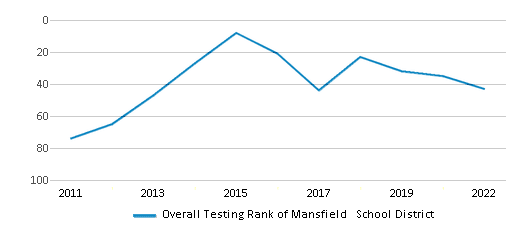
Math Test Scores (% Proficient)
61%
40%
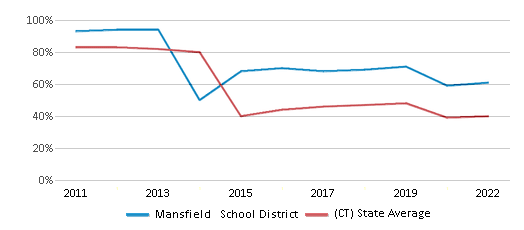
Reading/Language Arts Test Scores (% Proficient)
72%
50%
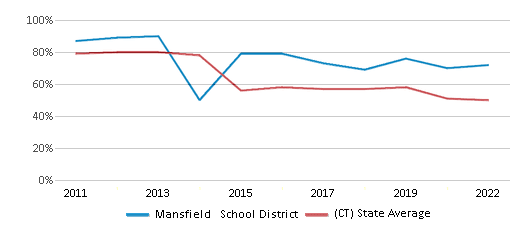
Science Test Scores (% Proficient)
80%
47%
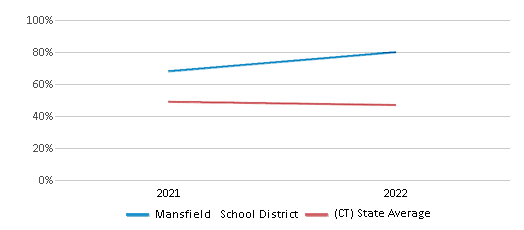
Students by Ethnicity:
Diversity Score
0.56
0.70
# American Indian Students
4 Students
381 Students
% American Indian Students
n/a
n/a
# Asian Students
135 Students
6,332 Students
% Asian Students
12%
5%
# Hispanic Students
205 Students
44,965 Students
% Hispanic Students
18%
34%
# Black Students
40 Students
19,832 Students
% Black Students
3%
15%
# White Students
738 Students
54,707 Students
% White Students
64%
41%
# Hawaiian Students
n/a
132 Students
% Hawaiian Students
n/a
n/a
# Two or more races Students
39 Students
6,568 Students
% of Two or more races Students
3%
5%
Students by Grade:
# Students in PK Grade:
94
14,518
# Students in K Grade:
118
19,819
# Students in 1st Grade:
138
19,906
# Students in 2nd Grade:
132
20,278
# Students in 3rd Grade:
134
15,997
# Students in 4th Grade:
125
16,056
# Students in 5th Grade:
88
13,209
# Students in 6th Grade:
99
5,100
# Students in 7th Grade:
117
3,978
# Students in 8th Grade:
117
3,865
# Students in 9th Grade:
-
67
# Students in 10th Grade:
-
64
# Students in 11th Grade:
-
43
# Students in 12th Grade:
-
54
# Ungraded Students:
-
-
District Revenue and Spending
The revenue/student of $29,217 is higher than the state median of $26,157. The school district revenue/student has declined by 10% over four school years.
The school district's spending/student of $29,090 is higher than the state median of $25,225. The school district spending/student has declined by 10% over four school years.
Total Revenue
$34 MM
$12,920 MM
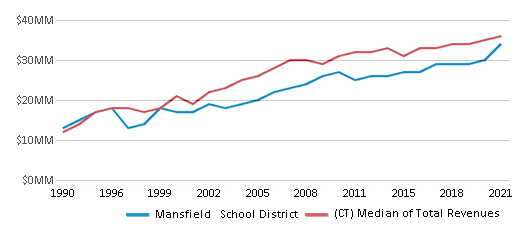
Spending
$34 MM
$12,459 MM
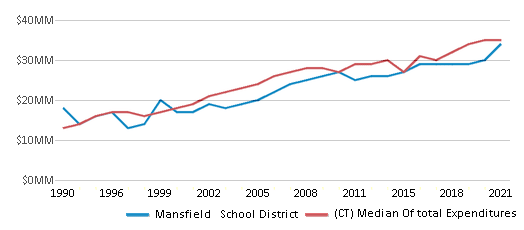
Revenue / Student
$29,217
$26,157
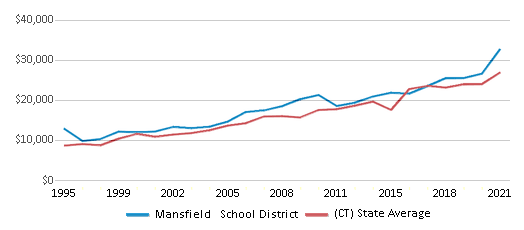
Spending / Student
$29,090
$25,225
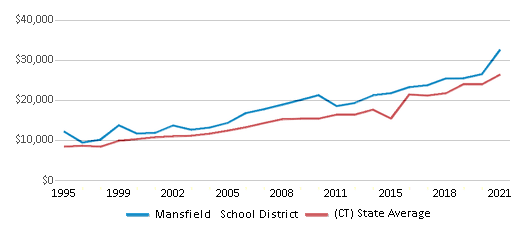
Best Mansfield School District Public Preschools (2025)
School
(Math and Reading Proficiency)
(Math and Reading Proficiency)
Location
Grades
Students
Rank: #11.
Southeast Elementary School
(Math: 60-69% | Reading: 70-79%)
Rank:
Rank:
9/
Top 20%10
134 Warrenville Rd.
Mansfield Center, CT 06250
(860) 423-1611
Mansfield Center, CT 06250
(860) 423-1611
Grades: PK-4
| 161 students
Rank: n/an/a
134 Warrenville Rd.
Mansfield Center, CT 06250
(860) 423-1611
Mansfield Center, CT 06250
(860) 423-1611
Grades: PK-4
| 580 students
Recent Articles

What Is A Charter School?
Explore the world of charter schools in this comprehensive guide. Learn about their history, how they operate, and the pros and cons of this educational innovation. Discover key facts about charter schools, including admission policies, demographics, and funding, as well as what to look for when considering a charter school for your child.

10 Reasons Why High School Sports Benefit Students
Discover the 10 compelling reasons why high school sports are beneficial for students. This comprehensive article explores how athletics enhance academic performance, foster personal growth, and develop crucial life skills. From improved fitness and time management to leadership development and community representation, learn why participating in high school sports can be a game-changer for students' overall success and well-being.

February 05, 2025
Understanding the U.S. Department of Education: Structure, Impact, and EvolutionWe explore how the Department of Education shapes American education, from its cabinet-level leadership to its impact on millions of students, written for general audiences seeking clarity on this vital institution.





